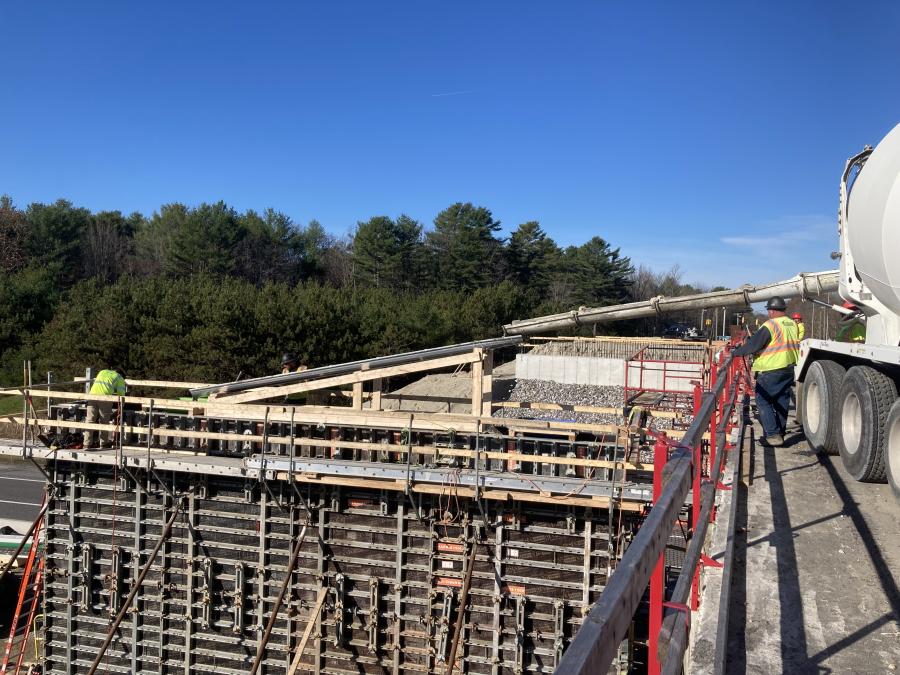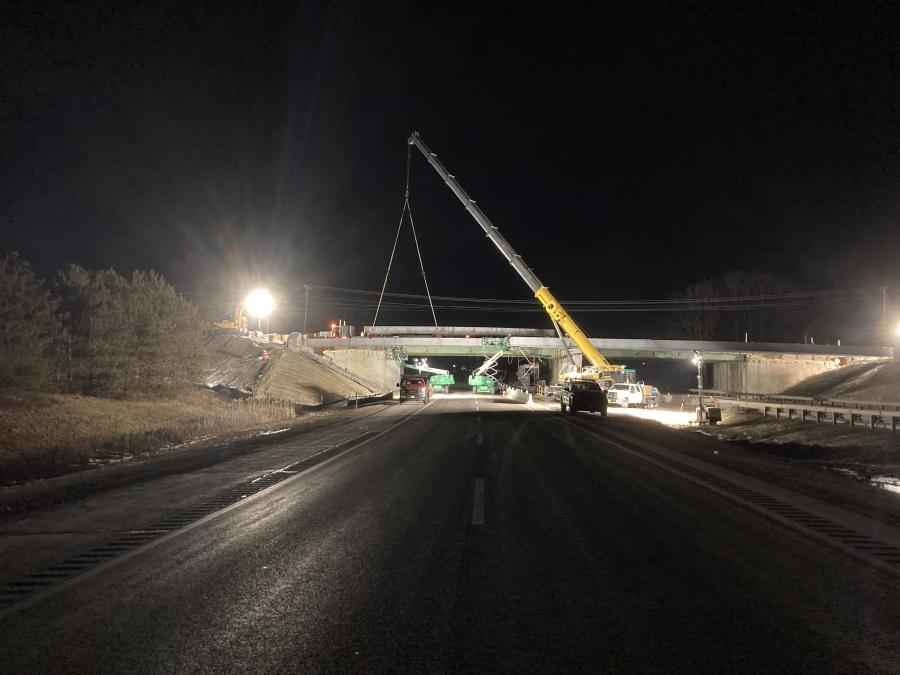The Desert Road bridge takes shape in Freeport.
(Photo courtesy of MaineDOT.)
Accessibility is an important aspect of all travel, and that especially holds true for coastal Maine.
Tourism in Maine is extremely important, accounting for approximately $4.9 billion to Maine's economy each year. So, it's important to maintain proper access through its most populated areas. To facilitate continued access through the state, the Maine Department of Transportation (MaineDOT) advertised three bundled bridge projects, which will enhance the Interstate 295 corridor in coastal Maine by widening several bridges on/over I-295 to improve vehicular, pedestrian and bicycle access through the area.
The three bridge projects are I-295 northbound and southbound over Route 1 in Yarmouth; the Approach Road and Merrill Road Bridges over I-295 in Freeport; and the Bucknam Road and Johnson Road Bridges over I-295 in Falmouth. The total cost of the three projects is approximately $73 million.
Devan Eaton is a senior project manager in the Bridge Program of MaineDOT.
"Many of our bridges over the interstate were built in the late 1950s and early 1960s and are in a deteriorated condition and need to be widened for capacity," he said. "Several of the bridges in these projects carry a lot of foot traffic and bicyclists, and the widened bridges will enable safer access to businesses and residences in the area."
Not only has the traffic load greatly increased over the years (now more than 20,000 vehicles per day on I-295) but the bridges also have been battered by winter storms and de-icing chemicals.
"We are taking steps to increase the life of the new bridges by including corrosion resistant reinforcement," said Eaton. "We are using stainless steel and low-carbon chromium reinforcing in the structures, which both resist corrosion. We are also using additives in the concrete to help resist chloride infiltration."
The structural steel girders will also be coated with a zinc-rich coating system that bonds to the steel and should provide longer life. Project designers project that these processes and materials will lead to a 100-year life for the bridges.
The new taller, wider bridges will provide more room for snow storage on the structures and lessen the potential for strikes from taller vehicles traveling the roads underneath. State specifications define that bridges on/over the interstate have a minimum vertical clearance of 15.5 ft., which many of the existing structures on the I-295 corridor do not meet.
In addition to dealing with wintry conditions, construction teams faced challenges with soft soils around the bridges. Often the coastal areas of Maine are covered with clays, particularly a soft bluish gray material that is especially common near the Presumpscot River. These clays are highly compressible, so to combat roadway settlement in specific locations, designers replaced standard gravels and fill material with lightweight materials to reduce loading.
"We decided to use ultra-lightweight foamed glass aggregate [ULFGA]," said Eaton. "This material has been used in locations on the projects with highly compressible soil. This material is fully encased within geotextile, and then capped with our typical roadway subbase materials, to prevent washouts of the lightweight materials."
The clay soils are a continual challenge to builders.
"The clay can liquify and it generally gets worse the more you mess with it," said Eaton.
The construction teams use retaining walls and temporary shoring to keep the clay in place. In many places the clays run more than 50-ft. deep. Bridge support systems (piles) were constructed to penetrate this clay layer and be driven to reach solid rock below.
Yarmouth Bridge Replacement
This project will replace two bridges that carry northbound and southbound I-295 traffic over Route 1 near exit 17 in Yarmouth. In addition to the bridge work, workers extended the Beth Condon Memorial Pathway, which runs under the bridges, along Route 1.
MaineDOT estimates that the project is approximately 40 percent complete. The project is scheduled to be finished by the end of November 2025.
The old bridge was more than 60 years old and had shown significant deterioration. The project will require 15,500 tons of asphalt for roadway work and approximately 3,400 cu. yds. of concrete. Composite bridge drains will reduce corrosion on materials used in the bridge deck.
The pedestrian and bicycle access through the area on Route 1 will be greatly improved. The wider structures on I-295 will significantly improve vehicular safety. CPM Constructors from Freeport is the lead contractor for the work.
Freeport Bridges
The project will replace two bridges that span I-295, one at exit 20 (Merrill Rd.) and the other at exit 22 (Approach Rd.). These two bridges are more than 60 years old and do not meet the height requirement to accommodate today's larger vehicles. Active bicycle and pedestrian traffic will have increased width for travel with the new bridges increasing safety for the users.
Each bridge will feature a 12-ft.-wide multiuse path that will tie into paths the town is planning to construct in the future. The improved capacity of the new bridges also will allow larger loads to travel through the area.
MaineDOT estimates that the bridge work is approximately 25 percent complete. The project is scheduled to be completed by the end of November 2025. McNamee Construction of Lincolndale, N.Y., is the contractor for this project.
Falmouth Bridges
The project will replace two bridges that span I-295, one at the exit 10 interchange (Bucknam Rd.), and the other just north at Johnson Road. The bridges are more than 60 years old and, although they meet legal limits, are below loading expectations for a structure over the interstate. Bucknam Road provides a route for pedestrians and cyclists through the area but is too narrow for safety in its existing condition. The design uses corrosion resistant reinforcing in the concrete and thermal spray coating on steel beams to increase structure life.
The steel from the old bridges will become the property of the contractor for recycling. The project requires approximately 4,600 tons of asphalt for the roadway work and 1,600 cu. yds. of concrete for bridge abutments, piers, bridge deck, slabs, curbs and sidewalks.
MaineDOT estimates that the bridge work is approximately 25 percent complete. The project is scheduled to be complete in December 2025. The contractor for this project is Wyman and Simpson from Richmond, Maine. CEG
Chuck MacDonald
Chuck MacDonald is an editor, blogger and freelance feature writer whose writing adventures have taken him to 48 states and 10 countries. He has been the editor for magazines on pavement construction, chemicals, insurance and missions. Chuck enjoys bicycling, kayaking and reading. He graduated from the University of Missouri with a degree in journalism. Chuck lives in Annapolis, Md. with his wife Kristen. They have seven grandchildren.
https://www.linkedin.com/in/chuckmacdonald/ Read more from Chuck MacDonald here.
Today's top stories






















